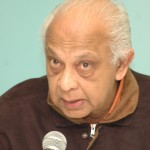Sri Lanka – Time For Review
By Brian Senewiratne –January 7, 2016

On January 8, 2015, what everyone thought was impossible occurred. Mahinda Rajapaksa who intended to be there for the foreseeable future, was tossed out of office at a Presidential election – a ‘political coup’ if ever there was one.
Maithripala Sirisena was elected President. He has now had a year in office and it is possible to see what changes he has done and will do in the future.
Of particular concern is the plight of the Tamil people in the North and East who have suffered the most serious violation of human rights at the hands of the (Sinhalese) Armed Forces who run the area and behave as an Army of Occupation and treat the people in the area as the ‘Spoils of War’ to be used and abused.
Will any of this change? The information to date, a year later (January 2016), is that it will not change. Sirisena has been emphatic that the Sri Lankan Armed Forces will remain in the North and East. Since the members of the Armed Forces are primarily responsible for most of the violation of human rights it is simply not possible to believe that anything will improve.
A premature Presidential election
With signs of dwindling political support in the country (as shown by a major setback in the recent provincial council elections), the then President Rajapaksa decided to have a snap Presidential election in January 2015, two years before it was due. In the Uva Province and Western Province elections in 2014, his party got a hiding. In Uva, votes for his party slumped from 72% in 2009, to 52% in 2014; in the Western Province, from 63% to 52%.
With the confidence of a dictator, he claimed that he will be the only candidate, implying that no one would (or dare to) contest him. The Opposition, and even his own party, had other ideas. In the scramble for a ‘common candidate’ to oppose him, several people were approached –including Chandrika Kumaratunga (the former Head of the Sri Lanka Freedom Party (SLFP) to which Rajapaksa belongs and who was sacked by him) and Ranil Wickremesinghe, (leader of the main Opposition Party – the United National Party – UNP). There was no decision.
On 21 November 2014, in one of the most amazing ‘political coups’ the country has ever seen, President Rajapaksa’s close friend, Cabinet Minister Maithripala Sirisena, Minister of Health and General Secretary of the SLFP, said he would contest President Rajapaksa as the ‘common opposition candidate’. President Rajapaksa promptly sacked Minister Sirisena, but that was not the end of the story – rather, the beginning.
At a media conference, flanked by Chandrika Kumaratunga and several SLFP heavyweights, he said:
“Thuggery, embezzlement, crime, drug mafia, nepotism and corruption have institutionalized under the Executive Presidency but alas President Rajapaksa or his government has done little to arrest this horrible and dangerous situation”. He said that the incumbent regime was “engulfed in nepotism, corruption and the abuse of the rule of law”. Read More

